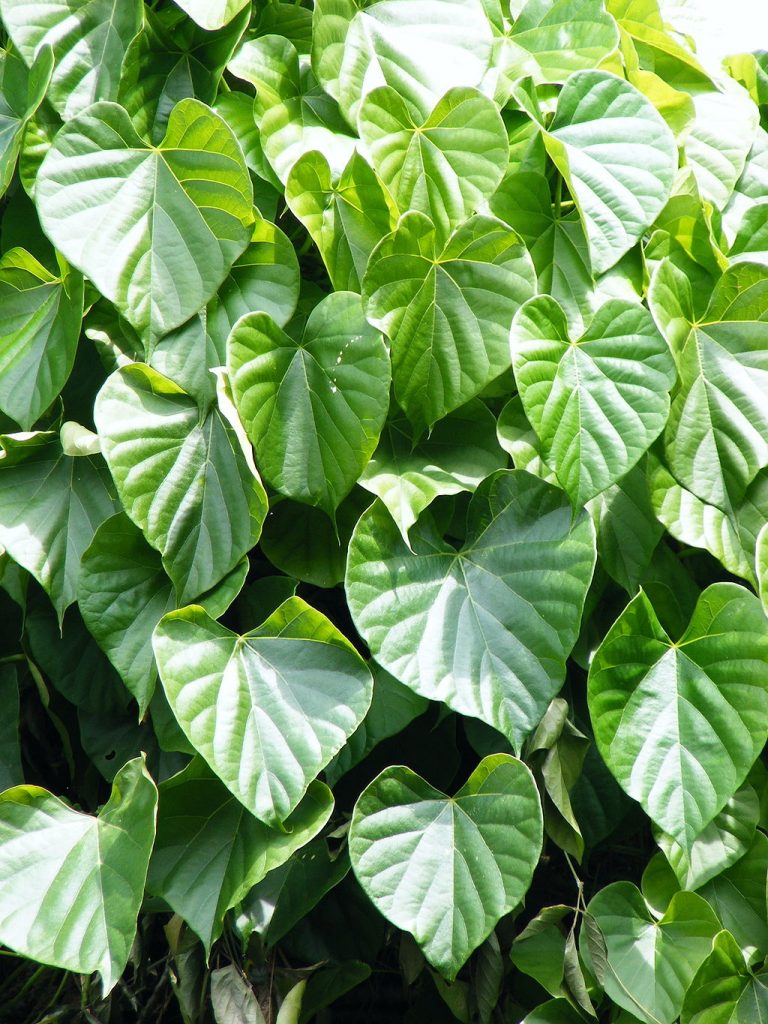 Guduchi (Tinospora cordifolia) is an ayurvedic herb belonging to the Menispermaceae family of plants. Other common names for guduchi include heart-shaped moonseed and giloy. The herb is a deciduous climbing vine with greenish yellow flowers that grows as high altitudes in parts of India and Sri Lanka. Guduchi has been used traditionally for its anti-stress, antidiabetic, antioxidant, anti-allergic, anti-microbial, hepatoprotective and immune enhancing effects. Evidence suggests that guduchi may also possess mood elevating effects in animals. For example, in one study, researchers investigated the effects of guduchi extracts on the mood of mice exposed to experimental stress. After 14 days of consuming guduchi extracts, the mice experienced significantly less depressive behaviour indicating the extracts may have had an antidepressant effect. Evidence suggests that the extracts inhibited the monoamine oxidase enzymes, thus raising levels of brain monoamine neurotransmitters.
Guduchi (Tinospora cordifolia) is an ayurvedic herb belonging to the Menispermaceae family of plants. Other common names for guduchi include heart-shaped moonseed and giloy. The herb is a deciduous climbing vine with greenish yellow flowers that grows as high altitudes in parts of India and Sri Lanka. Guduchi has been used traditionally for its anti-stress, antidiabetic, antioxidant, anti-allergic, anti-microbial, hepatoprotective and immune enhancing effects. Evidence suggests that guduchi may also possess mood elevating effects in animals. For example, in one study, researchers investigated the effects of guduchi extracts on the mood of mice exposed to experimental stress. After 14 days of consuming guduchi extracts, the mice experienced significantly less depressive behaviour indicating the extracts may have had an antidepressant effect. Evidence suggests that the extracts inhibited the monoamine oxidase enzymes, thus raising levels of brain monoamine neurotransmitters.
In another study the mood elevating effects of guduchi were tested on rats. Rats were deprived of sleep in order to induce detrimental mood changes such as anxiety and detrimental motor coordination. Administration of guduchi extract was able to significantly attenuate these negative sleep deprivation related effects. A number of cellular effects were observed that included a decrease in inflammation and an inhibition of markers that are associated with neuronal death. Therefore guduchi extracts appears to provide beneficial neurochemical changes that may occur as a result of sleep deprivation, and this produces cognitive benefits. Guduchi like many herbs also possesses significant antioxidant effects. These effects may play a central role in the beneficial effects of the herb as improving antioxidant status can have significant neuroprotective effects. Antioxidants may also significantly decrease inflammation and this may also indirectly protect neuronal structure and function.

Guduchi contains a number of phytochemicals that may explain its biological activity including alkaloids, steroids, diterpenoid lactones, aliphatics, phenolics, sesquiterpenoids, polysaccharides and glycosides. These phytochemicals give guduchi adaptogenic and rejuvenating properties. It is likely that some of the beneficial mood elevating effects from guduchi come from its anti-stress effects, as stress is an important factor in the development of anxiety and depression. However, increases in monoamine neurotransmitters and modulation to the GABA system may also be contributory factors. Image: By Tmd at Thai Wikipedia [Public domain], via Wikimedia Commons.
In another study, a poly herbal preparation called Rasayana Ghana, which contains Guduchi, along with Aamalaki (Emblica officinalis) and Gokshura (Tribulus terrestris) was administered to mice exposed to experimental stress. The results of the study showed that the tablet was able to confer anxiolytic and antidepressant effects on the mice. In addition, the co-administration of ghee and honey significantly increased the mood elevating effects of the Rasayana Ghana formula, but co-administration of diazepam did not further improve the mood elevating effects of the herbal preparation. In certain tests the Rasayana Ghana was as effective as the antidepressant drug imipramine at inhibiting the depressive symptoms in the mice. Evidence suggests that guduchi is non-toxic, which may make it a viable alternative to mainstream treatments for mood disorders. The anti-stress effects conferred by guduchi, along with increases in monoamine neurotransmitters, may account for its beneficial effects.
Eat Well, Stay Healthy, Protect Yourself
RdB
